Gray & Son Stays Safe While Innovating
BY AsphaltPro Staff
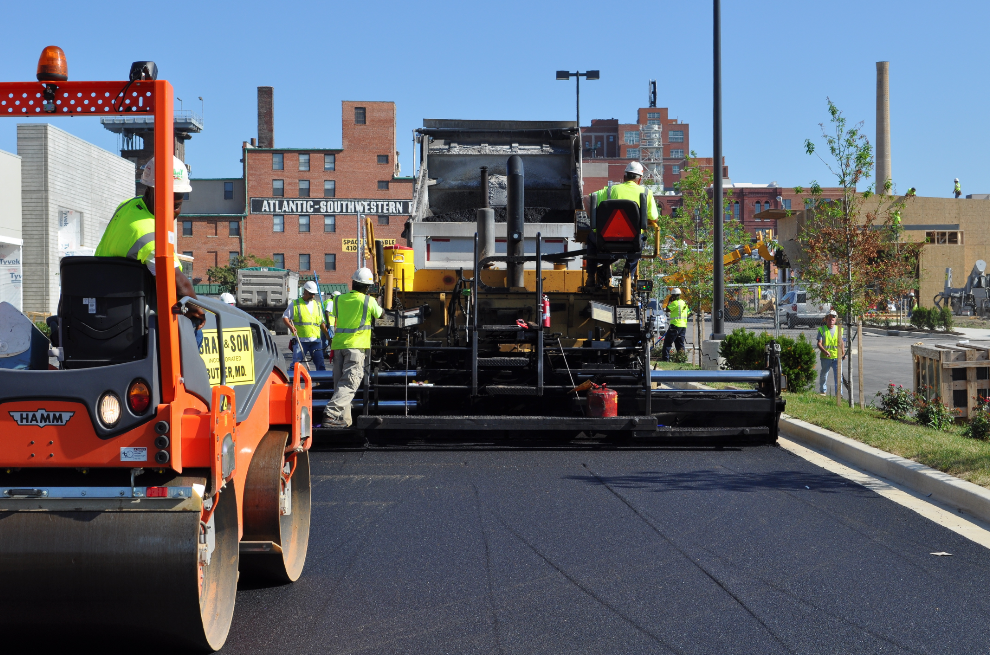
You can’t succeed in this industry without a commitment to safety. Federal and state governmental agencies set many standards, and asphalt producers and paving companies know how important safety is to their bottom line.
But the most successful companies of all don’t just follow the requirements. They establish a culture of safety. They innovate. And they communicate this vision and these goals to all employees.
That’s exactly what Gray & Son Inc. has done. And it’s why the Timonium, Maryland-based company has been named as an honorable mention for the American Road and Transportation Builders Association’s most recent safety award.
Today, Gray & Son and its sister company Maryland Paving employ 500 people during the peak season and operate seven asphalt plants in the Baltimore metro area. Half of the asphalt Maryland Paving makes is used by Gray & Son’s crews. Although asphalt paving accounts for 60 to 70 percent of Gray & Son’s work, the company also performs grading and utilities work, as well as stone and concrete.
Half of its paving portfolio is public work for municipalities, states and counties and the other half is split between commercial and residential work.
“Our residential work is full site work, like entire housing complexes where we’ll do the grading, the curbs, the paving,” said COO Rick Scheetz, who has been with the company for five years. “We offer the full package, which helps us wrap our asphalt paving in with our other services. It’s easy when you do everything from A to Z.”
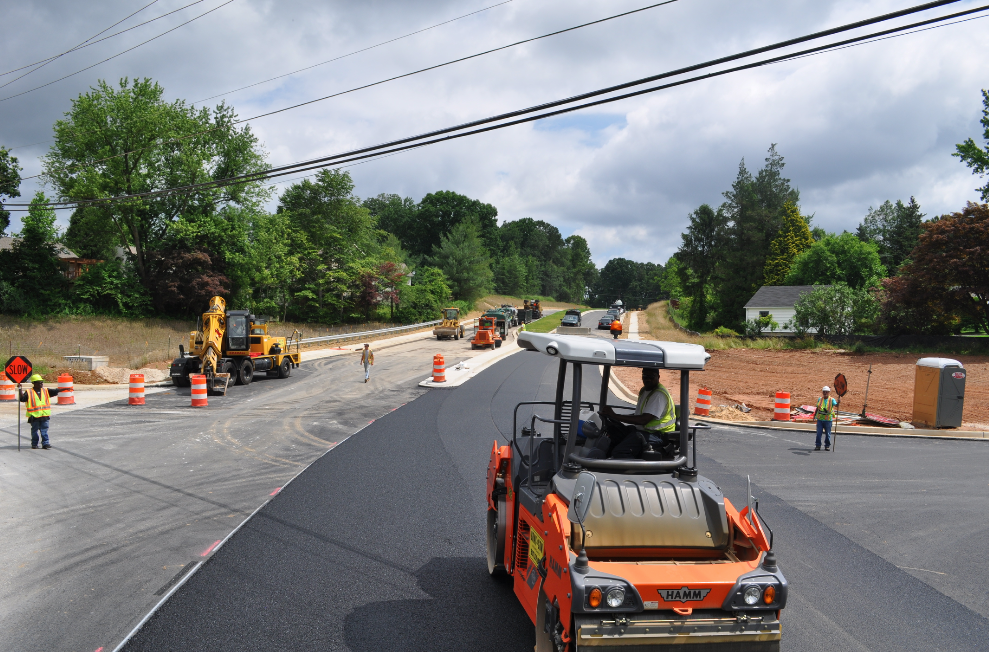
In addition to paving, the company also performs grading and utilities work, as well as stone and concrete.
Prioritize a Plan for Safety
“One thing that’s helped is making sure we set safety goals, whether that’s recordable incidents, utility hits, etc., we set goals and we communicate those goals to our employees,” Scheetz said.
For example, this year, the company has experienced more auto accidents than usual—like field equipment backing into something, Scheetz said—so the company is looking into ways to minimize those incidences, whether that be defensive driving courses or something else entirely. “We make our plans based on our goals.”
“Over the last decade, we’ve really changed our safety culture,” said Jeffrey Graf, executive vice president and general manager of Maryland Paving. “Safety is more of a function now. When you start the plant, it’s just part of your day. It’s just what we do now.”
But Graf admits getting to this point has taken time.
“We had to change the mindset of the older employees,” Graf said, himself included, he adds. “We used to jump in with both arms and both feet and now we really make sure everyone plans ahead and thinks everything through.”
One particularly innovative initiative Maryland Paving has begun to improve safety at the plant is to use camera systems throughout the plant.
“Maryland Paving has always had the buddy system and we always have looked out for each other,” Graf said. But now, the plant operator can quickly glance around the plant and make sure everyone is safe. “They also have full view of any blind spots.”
“At first everyone was worried about Big Brother, but that thought process has long gone away,” Graf said. “Now everyone sees the advantage of safety.” It also means the plant operator and key personnel can check in on the plant using an app on their phone 24/7 if they’re ever worried about something.
“It also helps with maintenance,” Graf said. “If a guy at one plant is working on something, a guy at another plant can zoom in on it and chime in if they can help in any way.”
Maryland Paving started the process of outfitting its plants with camera systems four years ago and will finish outfitting its last plant this winter. “Having the opportunity to invest in that camera system has been a big plus for us,” Graf said.
Maryland Paving is also in the process of upgrading one of its plants with a new baghouse/burner combination. “Like always, we want to stay up with emissions standards, low NOx burners, the capabilities to use alternative fuels,” Graf said. Three of the company’s seven plants already received this upgrade, and the others will soon.
Whenever they upgrade, the goal is to upgrade all of Maryland Paving’s plants. “It helps with inventory, so we don’t have to different inventory items for seven different baghouses,” Graf said. “And from a maintenance standpoint, the guys are familiar with all the tech and working on one type of technology.”
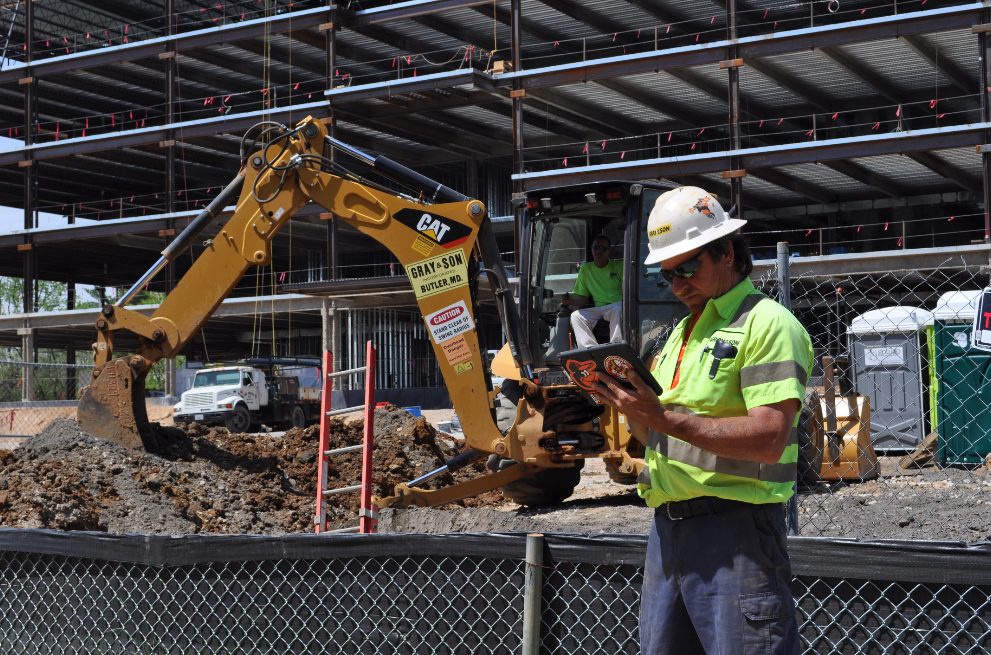
Another innovative solution that has impacted Gray & Son’s jobs is the implementation of tablets to monitor performance compared to the bid.
Equipped to Communicate
For the most part, Gray & Son’s seven paving crews run Caterpillar pavers and Hamm rollers, and its milling crews run Wirtgen milling machines, and the company is relatively particular about its equipment.
“When we go through a purchase decision, obviously price and service is important, but we also have operators run different brands of equipment,” Scheetz said. “They have a large say in terms of maneuverability, ease of use and quality of the results.”
But communication isn’t just important when it comes to purchasing decisions.
“We take painstaking efforts to make sure communication is there at all times, from purchasing equipment to communicating company results,” Scheetz said. Recently, the company implemented a field management system so every crew can know how their performance compares to the bid. “Now they know on a day-to-day basis where they are and they take great pride in making sure they hit or exceed those numbers. And that really helps with morale.”
In order to implement the new program, the company incorporated the change slowly. “We rolled out the first field systems to a few of the foreman we knew would adapt well to the change , so we could get some early wins and then roll it out to everyone,” Scheetz said. “Those early wins were key because then those guys became the trainers.”
To ensure the software would be adopted, it needed to be easy to use. “We worked hand in hand with Viewpoint to make sure there were fewer keystrokes to put in time and job progression, and that the metrics were easy to read.”
Now, every foreman has a tablet enabled with Viewpoint Field Manager software and share the numbers with their crew every day.
“The need to communicate starts from the top, and that’s something the owner and CEO Bob Webbert has instilled in all the managers,” Scheetz said. “He wants to make sure everyone is communicating.”
That means all foremen come in every morning before going out to the job. That means paper memos, emails, phone calls and texts. That also means annual safety meetings to “set the tone for the year,” Scheetz said.
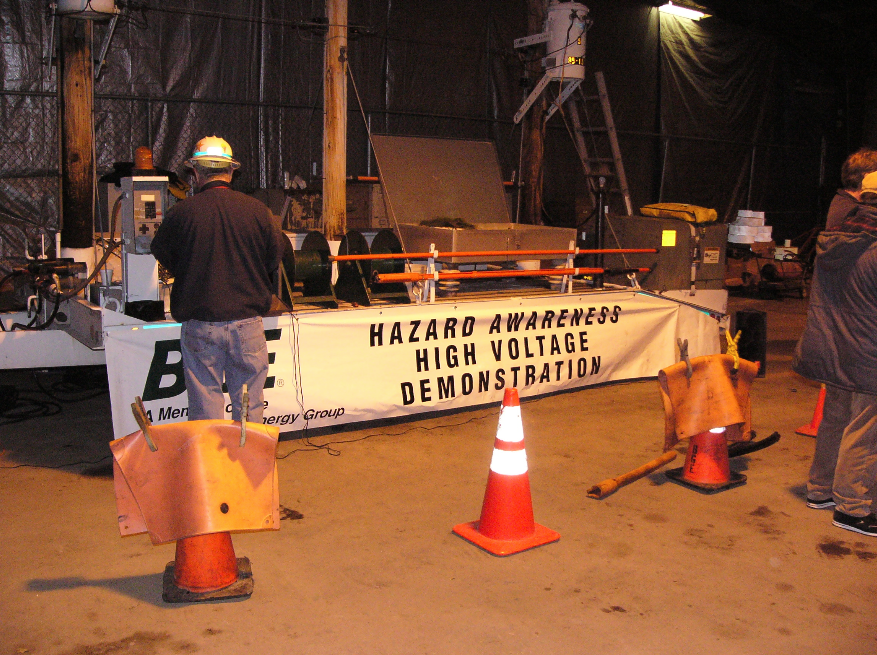
Training is also a key component of their safety program. “On rainy days, we pull people in for training and we cover everything from CPR to working in enclosed spaces,” Scheetz said.
Train at Every Opportunity
“Right now we’re digging deep into training,” Scheetz said. “Our foremen and superintendents have a lot of training to make sure they have the skills to manage a team well.”
New for 2017 the company will also offer training for employees with high potential—hi-po training—that includes six sessions of leadership training. “It’s hard to get good people,” Scheetz said. “Unless you’re stealing them from someone else, you need to grow them yourself and train them internally. So that’s a big initiative we’re pushing in both companies.”
Training is also a key component of their safety program. “On rainy days, we pull people in for training and we cover everything from CPR to working in enclosed spaces,” Scheetz said. They also have weekly discussions on hot topics, near misses, and recent happenings in the area. For example, someone working for another contractor in the area recently got his leg caught in the milling machine. “We present those things to our guys so they know it happens and it could happen to them.”
The foremen have those conversations every week and the crew must sign off that they heard and understood the discussion. Another important aspect of Gray & Son’s safety culture is the ability to openly discuss incidents and near misses. “Our guys aren’t afraid to speak up if they see someone doing an unsafe act,” Scheetz said. “We report on near misses. The employees see value in it because we spread the word and we actually act on it.”
“From a safety perspective, a lot of the responsibility falls on our employees,” Scheetz said. “They take it personal. That’s been our culture for years.”
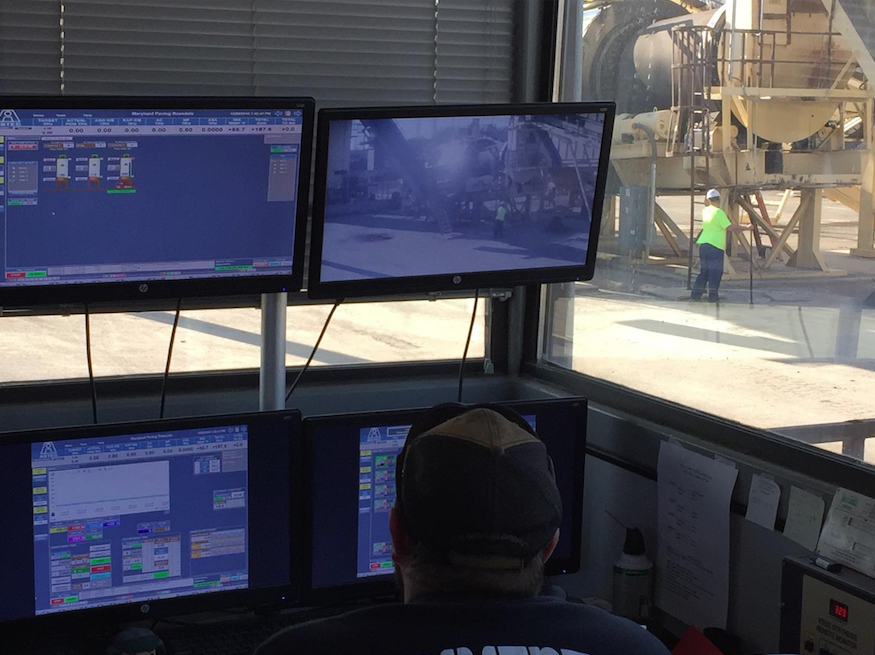
Maryland Paving is installing cameras at the plant to improve safety. Now, the plant operator can quickly glance around the plant and make sure everyone is safe on monitors like you see here.
Area Asphalt Plants
Maryland Paving has produced more than one million tons in 2016 at its seven asphalt plants in the Baltimore metro area.
The company operates an Astec double-barrel plant in Rosedale, an Astec double-barrel plant in Timonium, a Cedar Rapids counter flow drum mixer in Aberdeen, a CMI batch plant in Churchville, a Tarmac batch plant in Finksburg, and an Astec double drum plant and an HMB batch plant in Woodbine.
The company also has five laboratories, one of which is AMRL certified, and does all of its own mix designs and quality control testing in house.
“Everything we do is Superpave across the board,” Graf said. In fact, when that mix design came out, Graf played an instrumental part in helping Maryland counties to adopt it. “I knew that’s what the future was going to be, but when it first came out there was a magnitude of mixes that could be used and a lot of county engineers didn’t understand the Superpave system yet.”
So, Maryland Paving jumped in to help engineering firms understand the Superpave program and what mixes would fit their projects. “Some states still have marshall mixes and Superpave,” Graf said. “That would make it really complicated for a production facility like we have.”
Maryland Paving runs about 25 percent RAP and bases that number on Maryland’s asphalt binder replacement spec, and it doesn’t run recycled asphalt shingles.
